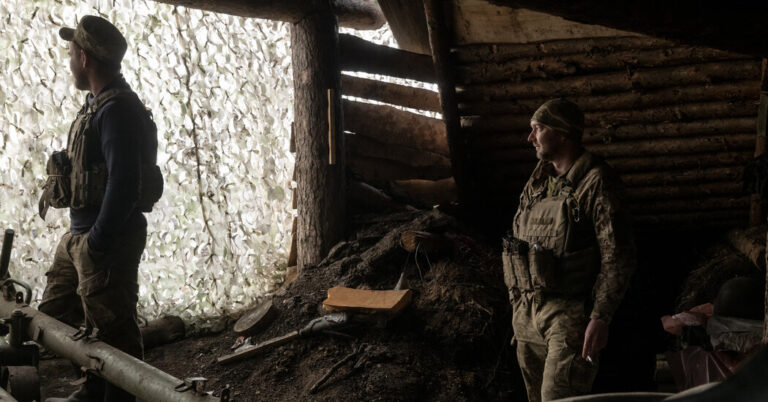From the bloody trenches of the battlefield to the crowded cities battered by Russian bombing, millions of Ukrainians waited with bated breath as the U.S. Congress prepared, after months of delay, to decide whether America would resume supplying its country essential military support.
Private Pavlo Kaliuk, fighting to slow the Russian advance after the fall of the town of Avdiivka in eastern Ukraine earlier this year, was on his way to the funeral of a fallen soldier when he was contacted by telephone on Friday.
“I walk and think maybe it’s my friend who died in the war, who is now in the sky, who will help the world and the United States support Ukraine,” he said.
Ukraine cannot count on divine intervention; instead, he is counting on the House of Representatives to approve a $60 billion aid package on Saturday.
President Volodymyr Zelensky has made the stakes clear, saying this week that without American support his country could not win the war. William J. Burns, the director of the CIA, was even more direct when asked what would happen if American military assistance was not resumed.
“I think there is a very real risk that the Ukrainians will lose on the battlefield by the end of 2024, or at least put Putin in a position where he could essentially dictate the terms of a political settlement,” he said. -he declared Thursday. at the Bush Center Leadership Forum in Dallas.
Dmytro Kuleba, Ukraine’s foreign minister, said there was “no plan B” if the aid measure failed.
“There has been so much controversy and debate around this bill – and there will be more – so let’s just wait for the outcome,” he told reporters.
At a meeting in Capri on Friday, representatives of the G7, made up of the world’s richest democracies, pledged to find a way to support Ukraine and, in particular, to strengthen the country’s air defense capabilities. Ukraine to save civilian lives and protect the country’s infrastructure.
Jens Stoltenberg, NATO Secretary General, said the military alliance had compiled data on available air defense systems and was working to redeploy some to Ukraine.
“It is necessary now to ensure that we have a more robust and institutionalized framework around support for Ukraine,” he told reporters in Italy.
Secretary of State Antony J. Blinken, also speaking in Italy, said that “Putin thinks he can wait faster than Ukraine, and faster than Ukraine’s support.”
“The message coming out of Capri is: He can’t,” the secretary said.
Congress has not approved a new military support program for Ukraine since October. While the Senate overwhelmingly approved a bill that bundled $60 billion for Ukraine as well as aid to Israel and Taiwan, it remained stalled in the Republican-controlled House. Republican President Mike Johnson split the package into a series of bills in an effort to bypass members of his own party who are fiercely opposed to aid to Ukraine.
If the tactic works and the measure is approved, Pentagon officials said military supplies could begin flowing to Ukraine immediately.
As the debate in Washington has played out over the past six months, the dynamics of the war have shifted decidedly in Moscow’s favor. The civilian death toll is also rising as Ukraine lacks air defense interceptor missiles to defend against daily Russian air attacks on critical infrastructure in densely populated cities.
At least seven civilians, including two children, were killed in missile strikes in the Dnipro region on Friday, including one near the main train station in the city of Dnipro. Four more civilians were killed in shelling of villages near the front line in eastern Ukraine, officials said.
Mr. Kuleba, the foreign minister, called U.S. aid “a matter of life and death,” adding: “And in a broader sense, it is a matter of Ukraine’s survival.” »


